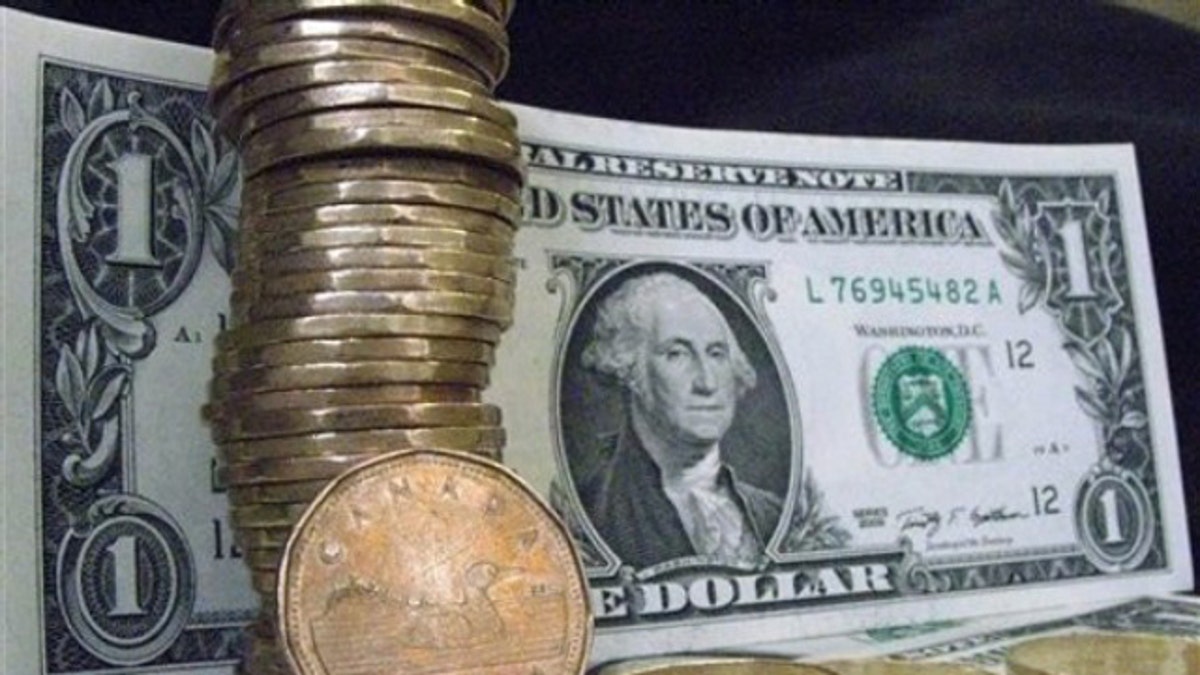
Canadian dollar coins, also known as "loonies," are posed with U.S dollar bills Tuesday, April 6, 2010, in Montreal. Canada's solid economic fundamentals amid global uncertainty helped push the loonie to parity Tuesday, taking it slightly above US$1 in early morning trading. (AP Photo/The Canadian Press, Ryan Remiorz) (AP)
Who doesn't love the word “free”?
7-Eleven gave away millions of Slurpees Monday, a marketing ploy that boosted sales of the sugary confection 38 percent last year. Technology companies, which once charged dearly for software, have taken that gratis model to the extreme: free e-mail, free apps, free music, free calling, free books, free everything.
The result: consumers have unprecedented access to information and entertainment. But is this new "freemium" world giving businesses a total brain freeze?
Freemium -- a conflation of free and premium -- is isn't new. Gillette hit on the concept decades ago: Give away razors for next to nothing, and then charge again and again for the replacement blades. Freemium is a variation on this theme. Get your customers hooked on the free stuff and they'll come back and pay for a better, “premium” version.
Today, countless popular tech companies employ a version of freemium, ranging from Pandora to Dropbox, Evernote to Zynga.
In the early days of the PC, this strategy made sense. Offer users software on a free trial basis because buying a package like Lotus 1-2-3 or Office was a major financial commitment that cost hundreds of dollars. It worked, assuming the product was reliable and useful. But such trial versions had one important restriction: a time limit.
Today's freemium services virtually never expire -- inspiring fewer and fewer of us to pay.
Take music services like Pandora. The free version has a 40-hour-per-month limit and ads. That should drive many music fans to the unlimited, $36 a year premium service. But just 15 percent of the company's revenue comes from subscribers, and Pandora has struggled to make a profit.
I love Pandora, but there are a slew of other free music services. So when my monthly free music time is up, I simply switch to Slacker or Last.fm -- or soon Spotify, a much-vaunted competitor from Europe that's expected to debut in the U.S. next week.
The same problem applies to online storage, free calling services, newspapers, even Web sites like this one. If I run out of storage on DropBox, I'll simply start using SkyDrive. If Microsoft decides that Skype should start charging for Internet calls, I'll switch to Google Talk.
It's great for consumers. But it's turning into a free eats free world.
The cost for consumers to switch is just about zero, but the cost for the companies isn't -- and it never will be.
There's a capital cost for any technology: dozens of servers, terabytes of storage, petaflops of processing power, and gigabits of bandwidth aren't free. Furthermore, services like Pandora pay millions to music rights holders. Even in the lowly world of news, journalists working on advanced cases of carpal tunnel syndrome have to get paid to report and write stories.
And we consumers can switch from one free service to another without a care in the world. If a better search engine were to come along tomorrow, we'd forget about Googling it and Snorf it or Dongle it or Twent it tomorrow.
And there is no service, no Web site so big or popular that it isn't susceptible to this threat. It's a danger even megasite Facebook currently faces: If most of us like Google+ more, what's to prevent us all from switching? In fact, many may see Google+ as an opportunity to start over and weed out some of those FB frenemies.
So if all the software, entertainment, and news you want is free now, how does any business get people to buy the razor blades?
Some companies have found a way, and others are experiencing limited success in other ways. Free anti-virus software for consumers can be a good thing for the developers if users provide alerts about new malware. Gaming companies like Zynga sell virtual razor blades, and players are buying digital gimcracks at a rapid clip. And there are ad-supported models that may work too.
Some will argue that the free ride can't last, you get what you pay for, and free services simply don't offer the quality of for-pay services. That's generally true.
The music quality of an online service can't match that of a CD. And free video games are a shadow of what a $40 console game offers. But for many of us, the free version is good enough.
I use the free OpenOffice software, for example, and I don't miss Microsoft Office at all (or Lotus 1-2-3, for that matter). In other words, I'm a sucker for free, too. In this economy, who can afford not to be?








































